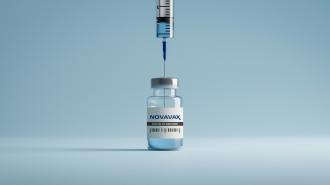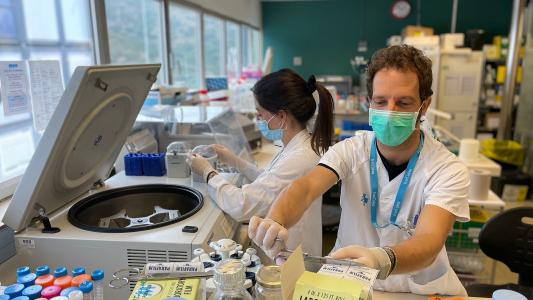The FDA has finally issued an emergency use authorization for Novavax’s COVID-19 vaccine, making it the fourth coronavirus vaccine approved in the US.
The shots developed by the Maryland-based biotech company are based on a more traditional technology than the mRNA or viral-vector vaccines, which could appeal to people who are wary of the currently available shots.
The challenge: The first two COVID-19 vaccines authorized by the FDA — developed by BioNTech/Pfizer and Moderna — were also the first mRNA vaccines ever approved.
Some people — even those who aren’t staunch anti-vaxxers — were hesitant to get the shots due to the general newness of mRNA vaccines and the fact that they were developed much faster than most vaccines (because, you know, global pandemic).
The next vaccine to be authorized in the US was one made by Johnson & Johnson. Although it used a more common technology, its rollout was temporarily halted because some recipients developed a rare blood clotting disorder. The result? More vaccine hesitancy.
Novavax’s COVID-19 vaccine was 90.4% effective at preventing infections in clinical trials.
What’s new? Novavax developed its own COVID-19 vaccine in 2020, using a more traditional protein-based technology. The vaccine uses nanoparticles studded with coronavirus spike proteins to create antibodies against the virus.
In clinical trials involving more than 25,000 participants in 2020 and 2021, the vaccine proved to be 90.4% effective at preventing COVID-19 infections — nearly as effective as the initial results for the mRNA vaccines.
As a bonus, trial participants reported modestly fewer side effects.
Supply chain problems and FDA reviews of manufacturing data have held up the vaccine for 18 months.
The high efficacy of the shot and the fact that it’s based on a tried-and-true vaccine technology has earned Novavax’s COVID-19 vaccine a fanbase of sorts, with “Novastans” insisting they won’t get vaccinated until they can get Novavax’s shot.
It’s been a longer wait than anyone expected. Even though Novavax’s trial results were in by January 2021 — just two months later than Pfizer and Moderna — supply chain problems and FDA reviews of manufacturing data have held up the vaccine for 18 months.
What’s new? The wait will soon be over, as the FDA has now issued an EUA for Novavax’s COVID-19 vaccine.
The final hurdle is a CDC advisory panel — scheduled to meet on July 19 — which needs to decide whether or not to recommend the shot. Then CDC itself will review the panel’s opinion when deciding if it should sign off on Novavax’s COVID-19 vaccine.
It if does, distribution can begin — the US has purchased enough doses to fully vaccinate 1.6 million people.
Like the approved vaccines, Novavax’s is likely to be less effective in practice than it was in trials.
The cold water: Only 10% of unvaccinated Americans surveyed by research firm Morning Consult said they’d “definitely” or “probably” get a protein-based COVID-19 vaccine (the same type as Novavax’s) if one was available.
That suggests that most people who aren’t vaccinated aren’t Novastans — they just don’t want any COVID-19 vaccine, for whatever reason.
Even if Novavax’s COVID-19 vaccine is well-received, the company’s trials were conducted before the highly contagious Omicron variant emerged, so the shot (like the existing approved vaccines) is likely to be less effective in practice than it was in trials.
The bottom line: Novavax’s COVID-19 vaccine will likely increase the number of vaccinated people in the US at least somewhat and will undoubtedly offer them more protection than if they remained unvaccinated.
However, at this point in the pandemic, what we really need is for the FDA to authorize updated boosters that target the current variants of the virus — like the ones Moderna and BioNTech/Pfizer have already trialed — or a universal coronavirus vaccine.
We’d love to hear from you! If you have a comment about this article or if you have a tip for a future Freethink story, please email us at tips@freethink.com.






